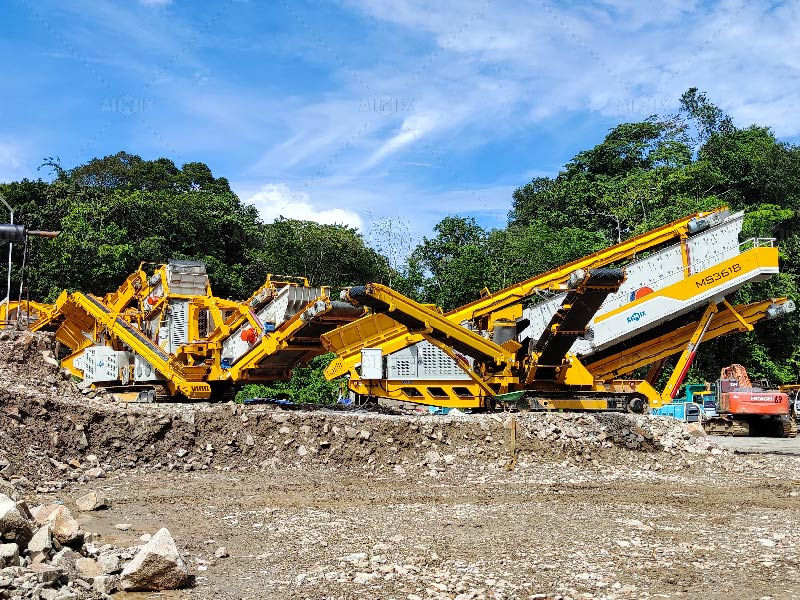Is the Mobile Crusher Suitable for Remote Areas?
- info515452
- 1月25日
- 讀畢需時 3 分鐘
In industries like construction, mining, and aggregate production, projects in remote locations often pose logistical and operational challenges. One of the most versatile solutions is the mobile stone crusher, which is designed to bring flexibility and efficiency to such challenging environments. This article explores whether a mobile crusher is the ideal choice for remote areas, considering its advantages, limitations, and impact on aggregate crushing plants.
Why Consider a Mobile Stone Crusher for Remote Areas?
Mobile stone crushers(trituradora movil de piedra) are engineered for flexibility and mobility, making them an excellent option for sites far from urban centers. Unlike fixed crushing plants, they are easy to transport and set up, which is essential for operations in isolated locations. But are they the best fit for your specific needs? Let’s dive deeper.

Key Advantages of Mobile Crushers in Remote Areas
1. Easy Transportation
One of the primary benefits of a mobile stone crusher is its portability.
Compact Design: Mobile crushers are built on a chassis, allowing them to be easily transported by truck or trailer.
Quick Relocation: They can be moved between sites without requiring complex dismantling or reassembly.
This feature is particularly useful for aggregate crushing plants operating in remote areas where transportation infrastructure may be limited.
2. Flexible Installation and Operation
Mobile crushers can be deployed quickly and efficiently.
Minimal Setup Time: Unlike fixed plants, mobile units require little to no foundation work.
Adaptability: They can be positioned closer to the material source, reducing hauling costs.
3. Self-Powered Systems
Many mobile stone crushers come equipped with their own power source.
Diesel Engines: These ensure uninterrupted operation in areas without access to electricity.
Hybrid Options: Some models combine diesel and electric power for improved fuel efficiency.
This independence makes mobile crushers ideal for remote sites with limited infrastructure.
4. Versatility in Crushing Applications
Mobile crushers are designed to handle various materials and production needs.
Material Types: From hard rocks to recycled concrete, they are versatile enough for diverse applications.
Adjustable Output: Operators can modify settings to produce different aggregate sizes, meeting project-specific requirements.
Challenges of Using Mobile Crushers in Remote Areas
1. Maintenance and Repairs
While mobile crushers are reliable, they require regular maintenance.
Access to Spare Parts: Remote locations may face delays in obtaining spare parts or technical support.
Skilled Operators: Ensuring operators are trained to perform basic repairs can mitigate downtime.
2. Fuel Supply
Diesel-powered mobile crushers depend on a steady fuel supply.
Logistics: Transporting fuel to remote sites can increase operational costs.
Storage: Adequate storage facilities are necessary to prevent disruptions.
3. Initial Investment
Mobile crushers often have a higher upfront cost compared to fixed plants.
Cost Justification: However, their flexibility and reduced hauling expenses often offset this over time.
How Mobile Crushers Enhance Aggregate Crushing Plants in Remote Areas
1. On-Site Crushing
Mobile crushers allow aggregate crushing plants(planta de trituración de agregados) to process materials directly at the site.
Reduced Hauling: Transporting raw materials to a central plant is eliminated.
Efficiency: This reduces fuel consumption and speeds up production timelines.
2. Scalability
Mobile crushers can easily scale production based on project needs.
Expandable Capacity: Additional units can be brought in as demand increases.
Temporary Solutions: Ideal for short-term projects where installing a fixed plant is impractical.
3. Environmental Benefits
Operating closer to the material source minimizes environmental impact.
Lower Emissions: Reduced transportation results in fewer greenhouse gas emissions.
Dust Control: Many mobile crushers are equipped with dust suppression systems, ensuring compliance with environmental regulations.
Choosing the Right Mobile Crusher for Remote Areas
1. Assessing Project Needs
Evaluate the scope and duration of your project.
Material Type: Ensure the crusher can handle the specific materials you need to process.
Production Capacity: Select a unit that meets your output requirements.
2. Considering Terrain and Accessibility
Remote areas often have rugged terrain.
Mobility Features: Look for models with all-terrain capabilities.
Compact Size: Smaller units may be easier to transport and position.
3. Support from Manufacturers
Partnering with a reliable manufacturer ensures smooth operations.
After-Sales Service: Opt for suppliers who provide maintenance and spare parts support.
Technical Training: Ensure operators receive adequate training for efficient use.
Conclusion
Mobile stone crushers are highly suitable for remote areas, offering unmatched flexibility, efficiency, and adaptability. They address key challenges associated with operating in isolated locations, such as limited infrastructure and transportation difficulties. While initial costs and maintenance logistics require careful planning, their long-term benefits often outweigh these concerns.
For aggregate crushing plants, mobile crushers streamline operations by reducing hauling distances, increasing productivity, and lowering environmental impact. By choosing the right equipment and partnering with a reliable manufacturer, you can ensure that your remote projects run smoothly and cost-effectively.
Investing in a mobile crusher is not just about acquiring machinery; it’s about gaining a versatile solution that meets the unique demands of remote operations.






留言